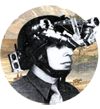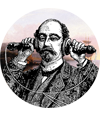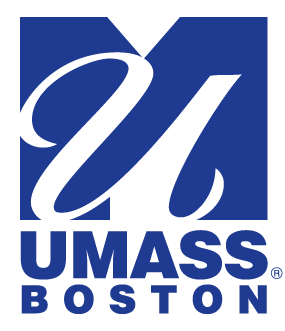A bit of crossposting on digital storytelling
Categories:
Thought I'd share a more appropriate post that I wrote for the PCM blog a couple of days ago. This is probably what I should be submitting for my field reports...
-----
Digital storytelling: The wonders never cease
10 Oct. 2008I've had the privilege of being part of two digital storytelling workshops at Portland Community Media: once as sort of a teacher's aide and the second time as a participant.
I first heard of digital storytelling in 2006 as I was rounding the corner to my last semester in college. I was home for winter break and decided to take advantage of my locale to learn about media centers in the San Francisco Bay Area. I met Theeba Soundararajan of Third World Majority (TWM) and Jessica McCoy, who was the CTC Vista for Center for Digital Storytelling (CDS) at the time.
Both were storytelling organizations with slightly differing missions. They're media centers focused on expression, but TWM was more focused on giving minorities and immigrant communities the media tools that have traditionally been used to ignore, suppress or misrepresent them.
Theeba opened my eyes to digital storytelling as a tool for those who have been sidestepped and wrongly represented on the local and national scene. As a person who has trained in journalism, I've seen much of this and even experienced it, which can be very jolting for someone who plays on both sides.
I've had a couple of experiences now, but the most shocking was after returning from Lesotho as a Peace Corps volunteer and hearing an NPR Marketplace broadcast entitled Chinese businesses rile Lesotho locals. To establish the scene, there's a lot of resentment against the Chinese by Basotho because the Chinese have been economically successful there while the Basotho are cementing themselves in poverty. As a Chinese American, I experienced a hefty amount of misdirected discrimination. The Marketplace broadcast seemed to side with the idea that the Chinese were snatching up every economic opportunity, leaving nothing for the Basotho. Granted, there are sketchy business decisions that some Chinese have made, but the Basotho are in their particular position most of all because of lack of entrepreneurial spirit (my official title as a PCV was "Small Business Advisor"). It was disturbing to hear the NPR report not because I share a physical appearance with the Chinese, but because I had experienced both sides and could not believe the lopsided situation an NPR show represented. Talk about a group that's exploited Lesotho's economy, where was any mention of South Africa and their complete infiltration into Basotho commodities and cultural goods? In many ways, Marketplace legitimized the discrimination against Lesotho's Chinese community. I still haven't heard a peep after writing a letter to the editor, not even acknowledgement of receipt.
the Chinese have been economically successful there while the Basotho are cementing themselves in poverty. As a Chinese American, I experienced a hefty amount of misdirected discrimination. The Marketplace broadcast seemed to side with the idea that the Chinese were snatching up every economic opportunity, leaving nothing for the Basotho. Granted, there are sketchy business decisions that some Chinese have made, but the Basotho are in their particular position most of all because of lack of entrepreneurial spirit (my official title as a PCV was "Small Business Advisor"). It was disturbing to hear the NPR report not because I share a physical appearance with the Chinese, but because I had experienced both sides and could not believe the lopsided situation an NPR show represented. Talk about a group that's exploited Lesotho's economy, where was any mention of South Africa and their complete infiltration into Basotho commodities and cultural goods? In many ways, Marketplace legitimized the discrimination against Lesotho's Chinese community. I still haven't heard a peep after writing a letter to the editor, not even acknowledgement of receipt.
Of course, this goes on everyday. There are countless misrepresentations in the news, and while it's hard to combat if you have limited media resources at your hand (which I've also experienced), it's even harder when you have none. In that case, there's no reason to even cultivate an audience.
Jessica and I spent much more time talking about the role of storytellers and story holders. Storytellers in our society can be seen as journalists, filmmakers, politicians--those who don't tell their own stories but tell other people's. Story holders are the people whose stories are being told. The big question for me at the time was if storytellers and story subjects share the intent of confronting readers with a question, is it better for the storyteller to tell it or the story holder? An unresolved question, but ultimately, we came to the conclusion that as nonprofessional storytellers, story holders have much more power to eschew pretenses and rules, dramatic questions, rhetoric or otherwise. Doing personal storytelling also serves to empower people in addition to getting the word out.
Back to the present-day, where I've been a part of two digital storytelling workshops. The first digital storytelling workshop I attended was a partnership between PCM and CDS. One particular person's story was about her predicament as an illegal immigrant who grew up in the US and knows no other home than the States. She doesn't qualify for college scholarships (a heavy burden for any student, especially spotlighted now in our recent economic crisis) because she'd have to prove citizenship. She speaks of looking "American" and being Latina, of being a high-achieving high schooler in AP courses with other Americans who are blind to her ethnicity and asked why "they" don't just go "home" and immigrate legally. At worst (and it's quite a short step in the case of illegal immigrants everywhere) she risks deportation with slim chances of return. At best, she can hope for sanctuary and some financial alleviation if the Dream Act passes.
Our instructor for the second workshop played this person's story as an example of digital storytelling. Several participants mentioned how uncomfortable the story made them feel, how her voice was trembling so much they thought she'd shatter into tears at any moment over her situation. They didn't know what to make of the story. Aside: I love awkward movies (The Squid and the Whale is a fantastic one), the tension around the white elephant in the room; I'm certain that awkwardness is an art itself in the art of film and acting. But that day in the second digital storytelling workshop, as I listened to the person's story again and heard the comments after, I realized that story holders have a power that storytellers do not. Because they're not ideas represented by actors and polished words, story holders have the power of truth in the voiceover room through the emotions they can't mask. It would be a shame if they could remove themselves.
Check out:
- The Oxford Project - A fantastic example of what storytellers and storyholders can do together.











